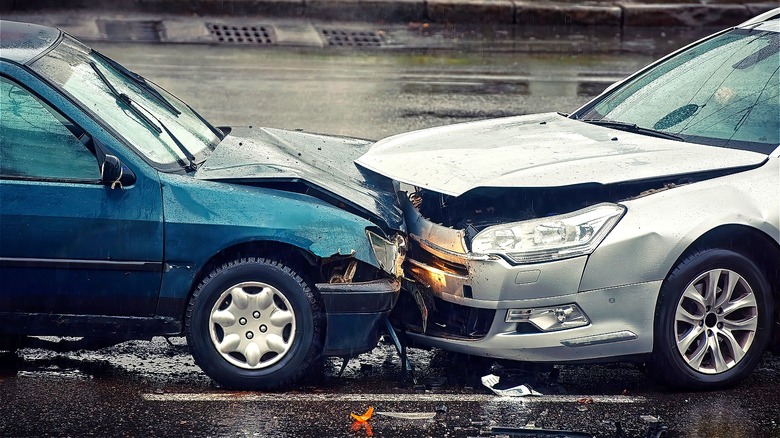The Staggering Rise In Auto Insurance Rates Explained
It's no secret that supply chain issues, combined with a massive monetary stimulus during the COVID-19 pandemic, resulted in hotter-than-normal levels of inflation for the United States, though today's rate is about 2.6 times less than it was during its peak in 2022. According to the official figures from the Bureau of Labor Statistics, the rate of inflation for the 12-month period ending in March 2024 was 3.5%. However, if you've recently had your auto insurance policy come up for renewal, you might be more than a little skeptical of that figure.
Per a recent study by Bankrate, in 2024, the average American consumer pays $2,543 per year for full-coverage car insurance. That represents a 26% increase in cost versus the prior year, or in other words, much higher than the official rate of inflation. Experts say that some savvy consumers are trying to lower their payment by requesting rate quotes from competitors to their current provider, but to no avail. Rates appear to be going up in lockstep among all insurers.
One of the reasons why car insurance is more expensive is because, well, cars have grown more expensive. In the event of a total loss from severe collision or theft, an insurer will pay significantly more to replace the vehicle than in years past. Also, some drivers will want to consider adding gap insurance to prevent experiencing a personal financial loss if a vehicle gets totaled.
Crashes are more frequent and severe
Unfortunately, a significant driver (pun intended) of the auto insurance industry's price hikes is a higher number of collisions — more of which have been deadly. In 2022, for example, the number of deaths on our roads hit 42,795. That's a jump of approximately 7,000 additional deaths versus the pre-pandemic time period, according to the National Highway Traffic Safety Administration.
So what's behind the increased number of collisions? Experts say riskier driving is to blame. That includes speeding, texting, and driving under the influence of drugs or alcohol. Frankly, the latter two reasons are surprising since it seems like society speaks out loudly against such behavior, yet here we are. Of course, issuing expensive speeding tickets attempts to deter some risk, but some drivers still don't obey the limits.
Compounding the problem is recent findings from the Highway Loss Data Institute, as reported to CNBC, indicating that 2022 model year vehicles are a full 33% heavier than their counterparts from 1985, while at the same time, packing almost 100% more horsepower under the hood. In a nutshell, heavier vehicles colliding at increased speeds is leading to more severe crashes. Interestingly, less severe low-speed car crashes might actually be declining due to improved safety features, such as automatic braking and lane correction, which emphasizes the more dangerous crashes that do still occur and aren't as preventable by technology.
Repairs have gotten more expensive
Another reason for rising auto insurance rates is that besides growing more expensive, modern vehicles are becoming more expensive to repair. Nowadays, vehicles are much more complex than their predecessors, in particular, all-electric and hybrid vehicles, which are packed with technology, as well as large, costly batteries. EV drivers may save money in the long run, depending on where they live, but not all auto repair shops have invested in the training and equipment to restore these cars following a collision. For the time being, those shops that are so equipped can command a premium price.
Owning an internal combustion engine (ICE) vehicle doesn't mean you get a pass on expensive repairs, however. In general, there's a shortage of skilled labor to repair automobiles, especially in a post-pandemic world. The higher price of repair parts, attributable to a larger inflationary picture, also contributes to the issue.
So what can you do? Reducing coverage, like dropping comprehensive coverage, may be possible but not always practical or allowed depending on the age and value of your vehicle and whether a lender or leasing company requires a certain level of coverage. Perhaps the most practical advice is to maintain a clean driving record, which is something that consumers do have control over.


